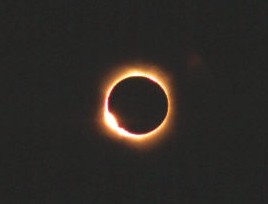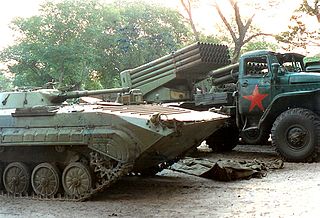 W
WA total solar eclipse took place on December 4, 2002 with a magnitude of 1.0244. A solar eclipse occurs when the Moon passes between Earth and the Sun, thereby totally or partly obscuring the image of the Sun for a viewer on Earth. A total solar eclipse occurs when the Moon's apparent diameter is larger than the Sun's, blocking all direct sunlight, turning day into darkness. Totality occurs in a narrow path across Earth's surface, with the partial solar eclipse visible over a surrounding region thousands of kilometres wide. It was visible from a narrow corridor in southern Africa, the Indian Ocean and southern Australia. A partial eclipse was seen from the much broader path of the Moon's penumbra, including most of Africa and Australia. During the sunset after the eclipse many observers in Australia saw numerous and unusual forms of a green flash.
 W
WUnited Nations Security Council resolution 1404, adopted unanimously on 18 April 2002, after reaffirming Resolution 864 (1993) and all subsequent resolutions on Angola, particularly resolutions 1127 (1997), 1173 (1998), 1237 (1999), 1295 (2000), 1336 (2001), 1348 (2001) and 1374 (2001), the Council extended the monitoring mechanism of sanctions against UNITA until 19 October 2002.
 W
WUnited Nations Security Council resolution 1412, adopted unanimously on 17 May 2002, after reaffirming resolutions 696 (1991), 864 (1993) and all subsequent resolutions on Angola, particularly Resolution 1127 (1997), the Council suspended travel restrictions against UNITA officials the country after the signing of a Memorandum of Understanding between it and the Angolan government.
 W
WUnited Nations Security Council resolution 1432, adopted unanimously on 15 August 2002, after reaffirming resolutions 1127 (1997) and 1412 (2002), the Council extended the suspension of travel restrictions against UNITA officials in Angola for a further 90 days.
 W
WUnited Nations Security Council resolution 1433, adopted unanimously on 15 August 2002, after recalling 696 (1991) and subsequent resolutions on the situation in Angola, particularly 1268 (1999), the Council authorised the establishment of the United Nations Mission in Angola (UNMA) as a follow-on mission to the United Nations Office in Angola (UNOA). Resolution 1433 was adopted on the same day the Council extended the suspension of travel restrictions against UNITA officials in Resolution 1432 (2002).
 W
WUnited Nations Security Council resolution 1439, adopted unanimously on 18 October 2002, after reaffirming Resolution 864 (1993) and all subsequent resolutions on Angola, particularly resolutions 1127 (1997), 1173 (1998), 1237 (1999), 1295 (2000), 1336 (2001), 1348 (2001), 1374 (2001), 1404 (2002), 1412 (2002) and 1432 (2002), the Council extended the monitoring mechanism of sanctions against UNITA for two months until 19 December 2002 and lifted a travel ban against its members.
 W
WUnited Nations Security Council resolution 1448, adopted unanimously on 9 December 2002, after reaffirming Resolution 864 (1993) and all subsequent resolutions on Angola, particularly resolutions 1127 (1997), 1173 (1998), 1237 (1999), 1295 (2000), 1336 (2001), 1348 (2001), 1374 (2001), 1404 (2002), 1412 (2002), 1432 (2002), 1434 (2002) and 1439 (2002), the Council noted progress in the country and lifted remaining sanctions against UNITA, including an arms embargo, travel restrictions and the freezing of assets.